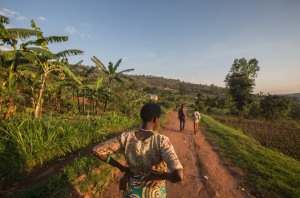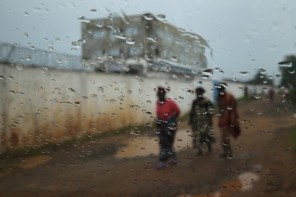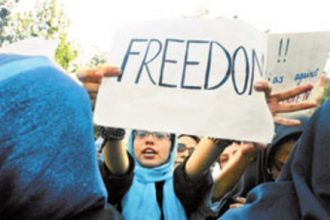I’m not a fan of making lives easy on my readers. I think the kind of bs we usually encounter in what fills our media lives–our televisions, mostly, or our YouTube channels–makes life too easy on us as it is. The stories we see are usually short and shallow; the people we meet in them are less people than caricatures of a point that’s being made. So I think a good dose of discomfort is a good thing. I have this weird belief that simply because it happened–because someone, somewhere had to live through it–we should have to think about it, just a little bit.
But this goes too far:
DOSHU, Congo (AP) – Zamuda Sikujuwa shuffles to a bench in the sunshine, pushes apart her thighs with a grimace of pain and pumps her fist up and down in a lewd-looking gesture to show how the militiamen shoved an automatic rifle inside her.
The brutish act tore apart her insides after seven of the men had taken turns raping her. She lost consciousness and wishes now that her life also had ended on that day.
Wait a second. Um, why? did she “push apart her thighs?” Was this her idea? Was she asked? Did she beg this journalist to look? Did an eager translator get a little too eager and ask for too much? Why does this happen in this story? And how am I supposed to trust this journalist? Not only did she think it was okay for Sikujuwa to expose herself “in the sunlight” and pantomime the abuse she suffered, but she decides she wants to tell me, the reader, about seeing it? Very first thing? (“Nice to meet you, I’m an AP story, hey, look at this rape victim…”)
Background: Rape in the Democratic Republic of Congo is a terrible, important issue. It needs attention–but all attention is not equal. It’s one thing to cover violence without cliche, and quite another to mistake gruesome details for humanizing details.
Even though this happened–even though this woman wanted to share this level of detail, and let’s assume it was Sikujuwa’s idea to show the journalist her vagina–why put it in the newspaper? Nothing about the language, the tone, or the style saves the way this is written from objectifying Zamuda Sikujuwa.
The article is about how the taboo on rape is being broken in Congo, as women, “empowered” by NGOs, are taught it’s okay to talk about it. I’m sympathetic to that idea, and to this journalist’s plight. It’s not easy to figure out what to do with all awful things you learn in the course of these kinds of stories, and it can feel pretty quickly like you’re self-censoring or sanitizing a story when you hold back.
But this is an example of one of the great dangers of human rights conflict journalism: in trying to make readers understand the situation of desperate people, we make them into desperate people in our stories–by the way we write, but also by the way we report, what our subjects feel we are asking of them. The danger of this kind of journalism is we exploit the violence and we caricature the victim, and we do it because we think it will make people want to read more. And because that’s how we know how to see Africa. The danger is that, in trying to communicate just how awful it is to be a victim of rape in Congo, we get a story like this, that makes me as a reader wonder what the reporter asked this woman to show her—and then the story puts that information in the lead, that first sentence that is designed to hook the reader and make them want to read more.
So you could say to yourself, “Hmm….the Associated Press thinks this will make me want to read about rape.” (And then you might, perhaps, say to yourself, “What does that say about the Associated Press?”)
Which brings me to my other objection: there’s no context in this article. Sikujuwa was raped by Tutsi fighters, it says; later, a woman is passed from Hutu rebel to Hutu rebel. We get a graph that says “big war, tribal lines, lots of deaths.” And that’s it. I know that Congo is complicated, and I know that we all have word limits. And to be fair, this isn’t a journalism problem alone; human rights workers have told me one of their frustrations is isolating social ills and trying to treat them in silos, as if they weren’t connected to the political chaos in which they happen. We all need more context to do our jobs, but it’s hard for our brains–and, for journalists, for the brains of our readers, who are trained (by us, it must be said) to see Africa as this wide space of anomie where people exist only to be abused.
I’m trying to be a more solution-oriented person, so here’s my suggestion for this particular piece and its author: When your story includes someone like Mireille Kahatwa Amani, use her. The story says that Kahatwa is a lawyer who works at the hospital where all the rape victims whose lives are now all over the Internet live, and she got funding from the State Department (and, presumably, other sources) to open a law office in that hospital. So far, the article says, Amani has “interviewed more than 250 victims and pursued more than 100 cases. In 11 months, they have received 30 judgments with only two acquittals. Those found guilty have been punished with sentences of five to 20 years in jail, Kahatwa says.”
What?! In a country that has been written off by The Experts as a totally stateless, lawless, helpless society, a single woman has opened files on 100 perpetrators of rape–and convicted 30 of them?* Check me on this, but I believe the pace and rate of Kahatwa ‘s success outdoes the ICC.
If I were the reporter, I would have followed Kahatwa for day or two. I would have come up with a scheme to anonymize the women she interviews, so it doesn’t compromise the legal cases, and I would’ve watched Kahatwa work. It would make great journalism, and it would also teach me the very things that are sorely missing in this article: what is the cultural context of all this? How do women talk about it with each other, not with white women who seem to have access to power and privilege? How does the story sound when the woman who tells it and the woman who listens are on the same side–in this case, pursuing justice? What changes about not just the details that are shared, but the way they are shared, when they aren’t just tools for a journalist to set a mood or scene?
Maybe the journalist wanted to do that; maybe she didn’t have time, or couldn’t find a female translator (if you’re smart about it, you’re not gonna do that interview with a man in the room). Maybe there were transportation or safety issues. There’s a lot of reasons that this might not have worked out for the AP reporter.
But I don’t think any of them absolves the story for the way it reinforces journalistic cliches about rape in Africa, or for making Zamuda Sikujuwa push apart her thighs.





Your idea would make a great story. But some journos would buck at the kind of necessary restrictions: confidentiality, agreeing not to approach women who aren’t ready to talk, maybe a few sessions of training.
When I was working with survivors of military rape during the Aberdeen scandal of 1996, I fielded numerous calls from TV reporters who wanted to talk to someone. Not just someone: a woman who a) was in the Army woman b) was raped in basic training c)by her drill sergeant d) who’d go on TV at 6:30 tomorrow. As if they were ordering up a burger.
Hi, great thinking here. I’m blogging specifically on the failed coverage of the DR Conflict and the horrific stories of what happens to the women in particular is startling – yet it makes it nowhere in the press.
I’d be interested on your thoughts on my blog, or here, as I’m trying to find and gauge the multitude of complex reasons (or perhaps simple reasons) western media is ignoring this huge war.
I also have a colleague who is expoloring how images of conflict are used in the media – asking specifically why horrific images are so often spurned, yet are surely best to show for public reaction in cases such as these?
The above comment is also correct: journalism should be ruled by sound ethical conduct. The persons affected should be respected, but they should also be respected by having their stories told should they want them to.
It would be most appreciated. Keep it up!
Interesting, compelling point. But to make a correction: Michelle Faul is actually an African woman reporter, not the “privileged white woman” you refer to her as.